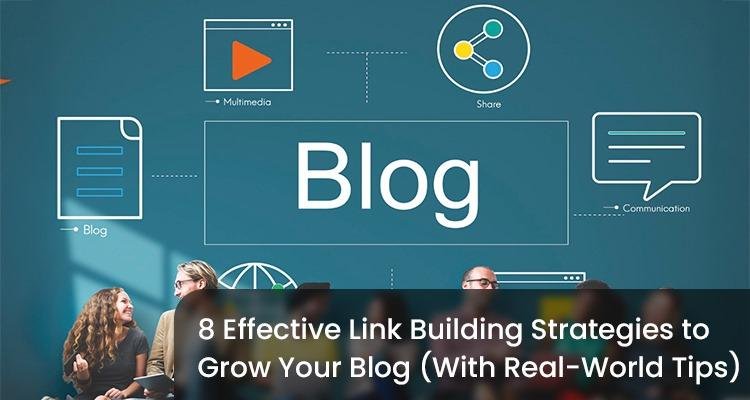8 Effective Link Building Strategies to Grow Your Blog (With Real-World Tips)

Struggling to get traffic to your blog? You’re not alone. Many bloggers pour their heart and soul into creating quality content, only to find that it’s not reaching the audience it deserves. That’s where link building comes in. You’ve probably heard the term before, maybe in a vague SEO context. But what does it really mean? And how can you make it work for you without sounding robotic or spammy? In this article, we’re diving into eight practical, human-friendly Link Building Strategies for Blog that actually work.
What Is Link Building and Why Should You Care?
In simple terms, link building means getting other websites to link back to your blog. These are called backlinks. And in the eyes of search engines like Google, backlinks are votes of confidence. The more high-quality sites that link to your content, the more trustworthy your blog appears, and the better your chances of ranking higher in search results.
Think of it like word-of-mouth for the internet. If a trusted expert points people to your blog, that’s a big deal. The key is to earn these links in a natural, ethical way that adds value for everyone involved.
1. Guest Blogging: Build Relationships and Credibility
Guest blogging is one of the oldest and most reliable link building strategies out there. Why? Because it’s mutually beneficial. You provide another website with quality content, and in return, they give you a link back to your blog.
Start by identifying blogs in your niche that accept guest posts. Look for sites that have a solid reputation and active readership. Then, pitch a relevant, helpful topic. The goal is to create something that genuinely benefits their audience.
Pro tip: Don’t just write a generic post. Tailor your content to their style and include a link back to a blog post of yours that complements the topic. That way, the backlink feels natural and adds value.
2. Create Content That Deserves to Be Linked To
Let’s be honest: no one wants to link to a blog post that says the same thing everyone else is saying. To earn backlinks, you need to create content that stands out. This could mean:
- In-depth guides that solve real problems
- Original research or case studies
- Interactive tools or checklists
- Eye-catching infographics
When you create something useful, people will naturally want to share it. Focus on being genuinely helpful, and the links will follow.
3. Broken Link Building: Help Others While Helping Yourself
Broken link building is one of those strategies that’s a little under the radar, but super effective. The idea is simple: find broken (a.k.a. dead) links on other websites and offer your content as a replacement.
Why does this work? Because website owners don’t want broken links on their pages. It’s bad for user experience and SEO. So when you point one out and offer a fix, you’re doing them a favor.
Use tools like Check My Links or Ahrefs to find broken links on relevant blogs. Then, reach out with a friendly email explaining what you found and suggesting your content as a replacement.
4. Turn Brand Mentions Into Backlinks
Sometimes, people mention your blog or brand online but forget to include a link. That’s a missed opportunity. The good news? You can fix it.
Monitor references of your name or blog using tools like Google Alerts or BrandMentions. If you come across one lacking a link, contact and gently request if they could provide one.
Most individuals are glad to comply to a rather straightforward request, especially if their work initially motivated or aided them.
5. Leave Significant Comments on Blogs
Commenting on blogs has a negative reputation, but if done correctly it may be a great tool for link development.
The important thing here is meaningful. Write something like “Great post!” and then drop your link. Rather, read the essay, consider it, and write a thoughtful comment that advances the discussion.
Many blogs let you link to your website from your name or profile. Even if the link is no-follow (which means it doesn’t directly affect SEO), you’re still establishing visibility in your specialty and relationships.
6. Share Your Content on Social Media
Social media may not directly affect your SEO rankings, but it plays a major role in getting your content seen and shared. The more eyes on your blog, the higher the chances someone will link to it.
Don’t just post a link once and forget about it. Share your content multiple times in different formats: quotes, images, short videos, stories. Repurpose blog posts into bite-sized tips, carousel posts, or reels.
Engage with your audience. Reply to comments. Join relevant groups. The goal is to get your content in front of the right people — those who might just include it in their next article.
7. Submit Your Blog to Resource Pages
Resource pages are curated lists of helpful content on specific topics. If your blog fits the bill, getting featured can result in a high-quality backlink.
Start by searching for phrases like “[your topic] + resource page” or “useful links for [your audience]”. Once you find a good fit, reach out to the site owner. Be clear about why your blog would be a valuable addition.
Make sure your content truly matches the intent of the page. If it’s a resource page for beginner gardening tips and your post is about advanced hydroponics, it’s probably not a great match.
8. Write Reviews and Testimonials
If you use a product or service regularly, consider writing a testimonial. Companies love showing off happy users on their websites, and they often include a link back to your blog.
This works especially well with SaaS tools, web hosting companies, online courses, or anything relevant to your blog niche. Just be honest and specific in your review.
Reach out to the company and offer your testimonial. Mention how their product helped you, and include your blog URL. It’s a low-effort strategy that can land you some powerful links.
Final Thoughts: Link Building Is About Relationships
Here’s the truth: link building isn’t just about SEO. It’s about making connections, sharing value, and building trust in your niche.
Start small. Choose one or two strategies from this list and put them into action. Be consistent, stay genuine, and focus on helping others. Over time, your backlinks will grow naturally, and so will your blog’s authority.
Content written by-Tanya
Tanya is part of the expert content marketing team at ITCombine. She has an expertise of curating meaningful information that can be used by visitors in general. Tanya is also involved in creating Client specific stories and blogs.
Copyright © 2025 - itcombine.com.
All Rights Reserved.








